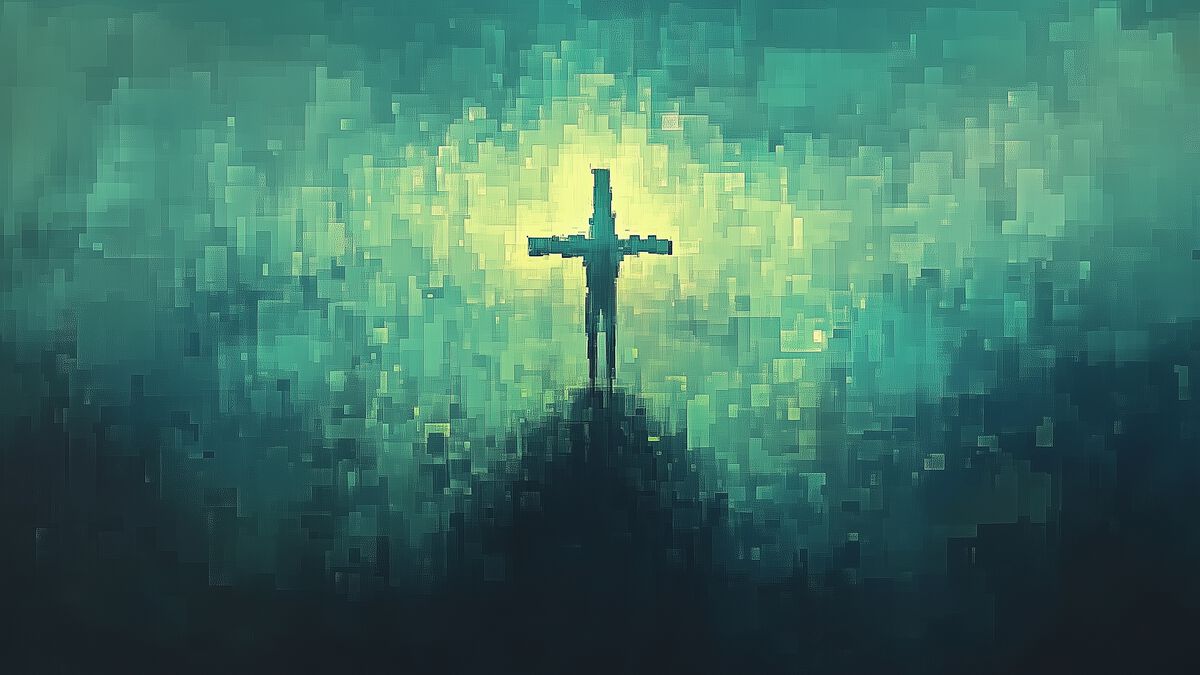From Dust to Christ
Lincoln Cannon
20 June 2015 (updated 3 January 2026)
One of my favorite passages of the Book of Mormon is the speech of King Benjamin in Mosiah 2-5. In the speech, Benjamin makes three observations about the (in)significance of humanity that have informed my interpretation of the Gospel of Christ, particularly in light of contemporary science and social trends.
Humanity in Space
Here’s Benjamin’s first observation:
“And now I ask, can ye say aught of yourselves? I answer you, Nay. Ye cannot say that ye are even as much as the dust of the earth; yet ye were created of the dust of the earth; but behold, it belongeth to him who created you.”
So small, the dust of the Earth, we imagine it intuitively. And yet on reflection, it becomes smaller still. On a cosmological scale, even the Earth is hardly dust.
- Diameter of Earth = 12,756 km
- Diameter of Jupiter = 142,984 km = Diameter of Earth * 11
- Diameter of the Sun = 1,391,684 km = Diameter of Jupiter * 10
- Diameter of the Solar System = 30,000,000,000,000 km = Diameter of the Sun * 21,556,618
If Earth were about the size of a BB (the tiny ammunition for a BB gun) then Jupiter would be about the size of a golf ball, the Sun would be about the size of a basketball, and the Solar System would consist of a 2,738 km radius around that basketball.
Although billions of times larger than the Earth, the Solar System is also hardly dust.
- Diameter of the Solar System = 3 light years
- Diameter of the Milky Way galaxy = 100,000 light years = Diameter of the Solar System * 33,333
- Diameter of the Local Group cluster = 10,000,000 light years = Diameter of the Milky Way galaxy * 100
- Diameter of the Laniakea supercluster = 500,000,000 light years = Diameter of the Local Group cluster * 50
- Diameter of the visible universe = 93,000,000,000 light years = Diameter of the Laniakea supercluster * 186
Many billions of times larger than the Solar System, the visible universe itself is only the portion of the universe that we can see, dimly, within the constraints of physics. The invisible universe beyond may be billions of times larger, perhaps embedded within billions of multiverses, and maybe even infinite.
Humanity in Time
Small as we are in space, further reflection on time makes us smaller still. Although the Earth has been around billions of years, you and I have not. On a biological scale, even humanity is hardly dust.
- Industrial revolution = 200 years ago
- Agricultural revolution = 10,000 years ago
- Homo Sapiens Sapiens subspecies (modern humans) = 200,000 years ago
- Homo Sapiens species (primitive humans) = 1,000,000 years ago
- Homo genus (similar to humans) = 3,000,000 years ago
- Hominidae family (great apes) = 20,000,000 years ago
- Primates = 60,000,000 years ago
- Mammals = 200,000,000 years ago
- Reptiles = 300,000,000 years ago
- Amphibians = 360,000,000 years ago
- Fish = 500,000,000 years ago
- Simple animals = 600,000,000 years ago
- Multicellular life = 1,000,000,000 years ago
- Complex cells = 2,000,000,000 years ago
- Simple cells = 3,500,000,000 years ago
- Sun and Earth = 4,500,000,000 years ago
- Universe = 14,000,000,000 years ago
Less than the dust of the Earth, which is billions of times smaller than the Solar System, which is many billions of times smaller than the visible universe, which is billions of years old, you and I are insignificant in space and time at cosmological and biological scales.
Dusty Beggars
Here’s Benjamin’s second observation:
“For behold, are we not all beggars? Do we not all depend upon the same Being, even God, for all the substance which we have, for both food and raiment, and for gold, and for silver, and for all the riches which we have of every kind?”
Most of us do not like to imagine ourselves as beggars, utterly dependent on powers and opportunities, Gods and graces, beyond ourselves. And yet on contemplation, we cannot reasonably conclude otherwise.
- Humans that are dying by age 5 = 350,000,000 (5% of humanity)
- Humans that lack basic nutrition = 800,000,000 (11% of humanity)
- Humans that lack basic sanitation = 1,000,000,000 (14% of humanity)
- Humans that live on less than $1.25 per day = 1,200,000,000 (17% of humanity)
- Humans that lack basic education = 1,300,000,000 (18% of humanity)
- Humans that are dying by age 70 = 3,500,000,000 (50% of humanity)
- Humans that live on less than $10 per day = 5,200,000,000 (74% of humanity)
- Humans that are dying by age 120 = 7,000,000,000 (100% of humanity)
Even while our income, education, sanitation, nutrition, and life itself are so tenuous, it seems we don’t care enough to help each other. According to the United Nations, we could provide basic nutrition worldwide for $30 billion per year. Meanwhile, we’re spending $722 billion per year on cigarettes, $1.7 trillion per year on militaries, and over $2 trillion per year on entertainment. If we set aside even 1% of our spending on cigarettes, militaries, and entertainment, we could have more than enough money to provide basic nutrition worldwide. But we actually too often go out of our way to make matters worse, committing many millions of robberies and assaults, and hundreds of thousands of rapes and murders each year.
Superhuman Christs
Finally, here’s Benjamin’s third observation:
“I would that ye should take upon you the name of Christ, all you that have entered into the covenant with God that ye should be obedient unto the end of your lives. And it shall come to pass that whosoever doeth this shall be found at the right hand of God, for he shall know the name by which he is called; for he shall be called by the name of Christ.”
In the Christian tradition, Christ is the ultimate expression of creation and compassion. Christ is messiah and savior, set apart with the special purpose of overcoming all that oppresses us, whether it be poverty, suffering, or even death. And of course Christ is Jesus, exemplified by Jesus, and even defined by Jesus. Many students of the New Testament stop there, although Jesus did not.
As Jesus invited us to be one with him, do greater works than him, and share with him the glory of God, so Benjamin encourages us to take the name of Christ. He encourages us all to an immersive discipleship of Jesus. With Jesus, he would that we trust in, change toward, and fully immerse ourselves in the role of Christ. He would that we be messiahs and saviors: consoling, healing, and raising each other together.
Such audacity, small and beggarly as we are, that we might aspire to be Christ! That we might aspire to creation and compassion radically beyond our present capacities! Or is it just arrogance?
Whether audacious or arrogant, Benjamin proposes a paradox. On the one hand, we may be insignificant, even abysmally so. On the other, we may be significant beyond our most sublime imaginings. This paradox, and the practical tension it produces to motivate strenuous action toward emulating creativity and compassion, is the strength of Christianity, so far as this Christian has experienced it.
“… in as many ways as possible we try to take upon us [Christ’s] identity, and we begin by taking upon us His name. That name is formally bestowed by covenant in the saving ordinances of the gospel. These start with baptism and conclude with temple covenants, with many others, such as partaking of the sacrament, laced throughout our lives as additional blessings and reminders.
“Teaching the people of his day the message we give this morning, Nephi said: ‘Follow the Son, with full purpose of heart, … with real intent, … take upon you the name of Christ. … Do the things which I have told you I have seen that your Lord and your Redeemer [will] do.’ Following these most basic teachings, a splendor of connections to Christ opens up to us in multitudinous ways: prayer and fasting and meditation upon His purposes, savoring the scriptures, giving service to others, ‘succor[ing] the weak, lift[ing] up the hands which hang down, … strengthen[ing] the feeble knees.’
“Above all else, loving with ‘the pure love of Christ,’ that gift that ‘never faileth,’ that gift that ‘beareth all things, believeth all things, hopeth all things, [and] endureth all things.’ Soon, with that kind of love, we realize our days hold scores of thoroughfares leading to the Master and that every time we reach out, however feebly, for Him, we discover He has been anxiously trying to reach us. So we step, we strive, we seek, and we never yield.” (Elder Jeffrey Holland, “Broken Things to Mend,” LDS Church General Conference, April 2006)



